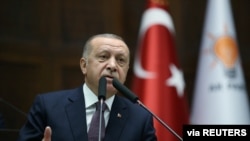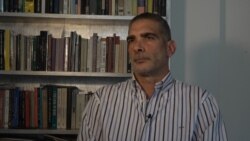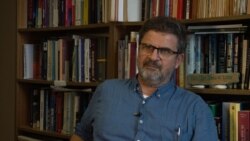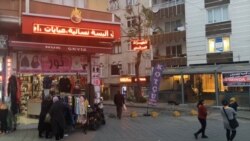Syria is set to top the agenda of talks Tuesday between Turkish President Recep Tayyip Erdogan and French, British and German leaders on the sidelines of the London NATO summit.
Ankara is facing criticism over its military operation into Syria targeting a Kurdish militia, while Erdogan is seeking European backing for his plan to repatriate millions of Syrian refugees in Turkey.
When Erdogan meets with British Prime Minister Boris Johnson, German Chancellor Angela Merkel and French President Emmanuel Macron, he is expected to deliver an unequivocal message.
"He (Erdogan) is quite transparent on his demands," said former senior Turkish diplomat Aydin Selcen, who served across the region. "Definitely, he asks for the Europeans to do more, and he has a point, a fair point."
Selcen added, "Turkey is host to 3.5 to 4 million Syrians. It's also true this is Europeans' weak point, and the priority for Europeans is to stop migration or even turn it around."
According to Erdogan, October's Turkish military operation into Syria against a Kurdish militia is creating an opportunity to send up to 2 million Syrians in Turkey back to territory seized by Turkish forces.
Turkish forces, along with Syrian militias, have created what Erdogan calls a "safe zone" in Syria. Erdogan claims hundreds of thousands of new homes will be built in the area allowing the return of Syrians.
But with Ankara putting a price tag of around $27 billion for the project, Erdogan sees Europe as key to achieving his goal.
"Turkey doesn't have the money first and foremost to finance such ambitious housing projects," said international relations professor Serhat Guvenc of Istanbul's Kadir Has University. "Moreover, getting other European nations onboard will improve the legitimacy of the project. So, there is the political aspect. There is the financial aspect."
But analysts predict Erdogan is facing a tough sell in securing European support for his refugee plan.
"When it comes to Europeans, they already made clear that they see this move as contrary to the fragile stability of Syria, and that they're not going to take part in the rebuilding effort. And they consider this forceful sending back of these Syrian migrants living in Turkey under a special status to be pushed back to this pocket (northern Syria) as illegal," Selcen said.
Ankara also has been accused by European politicians of seeking to change the region's demographics by replacing Kurds with Arabs, an accusation Ankara denies.
Macron has sharply criticized Turkey's military operation against the Syrian Kurdish militias, which Ankara considers as terrorists.
Adding to Ankara's anger, Macron last month hosted Kurdish militia leaders.
Erdogan hit back last week, describing Macron's criticism of Turkey's Syria policy as "a sick and shallow understanding," adding that the French president needed to check whether he was "brain dead."
Despite the undiplomatic language, Tuesday's meeting is still scheduled to occur, which some analysts suggest is an indication of the powerful leverage Erdogan retains over Europe.
"A couple of times, you know he (Erdogan) not only hinted, but he deliberately said that he might open the floodgates of refugees (to Europe) if Turkey is pressured, especially criticized, over its recent incursion into Syria," said Guvenc. "Therefore, the refugees are, I guess, a very convincing argument for Erdogan to get his European counterparts around the idea."
According to sources close to Ankara, Berlin has already agreed in principle to provide some financial support to Erdogan's Syria refugee plan.
Ankara is also stepping up diplomatic pressure, with reports that it will veto NATO defense plans to protect Poland and the Baltic members from any Russian aggression. Turkish foreign minister Mevlut Cavusoglu denied charges of blackmail but said Turkey needed to protect its interests.
"NATO needs to act to address all of its allies' concerns. If it addresses some members' concerns and objects to others, then there isn't unity within NATO," Cavusoglu said Thursday. "Turkey is negotiating with NATO Secretary General Jens Stoltenberg to secure "a middle way."
With Erdogan facing growing domestic pressure to repatriate Syrians, and European leaders wary of more refugees, all sides appear to have a powerful incentive to reach a compromise on Tuesday.
"The chances of Erdogan achieving all his goals (are) dim, let's be honest," said Guvenc. "But previous experiences have shown international crisis over Syria, civil war and refugees has had direct ramifications on several European states. In particular, Germany. So, if those leaders, if they are interested in winning elections, they will try and find ways to accommodate Erdogan."









